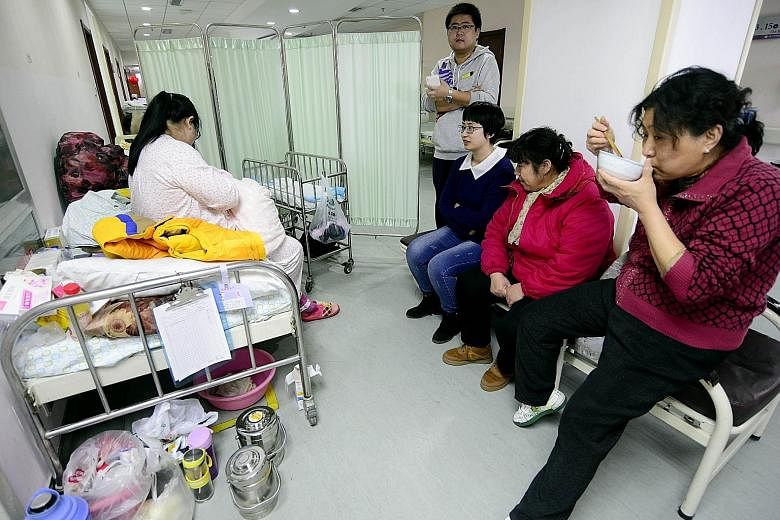BEIJING • Major hospitals in the Chinese capital are setting aside twice as many beds as usual for women with high-risk pregnancies amid a baby boom in China.
The number of pregnant women in Beijing last month was the highest for any single month since May 2014, according to data cited by the 21st Century Business Herald.
About 400,000 births are expected in the Chinese capital this year, exceeding the 360,000 estimated previously, the report said.
The Year of the Monkey, which began on Feb 8, is traditionally regarded an auspicious year for giving birth. Another reason is the recent abolition of China's controversial one-child policy.
Starting from Jan 1, all couples on the mainland are allowed to have two kids.
Under the new population policy, about 90 million women across China are now eligible to have a second baby. More than half of them are between 40 and 49, according to the National Health and Family Planning Commission.
Mr Chao Wei, a publicity official from Beijing Obstetrics and Gynaecology Hospital, told China Daily that more than 70 per cent of the pregnant women it admits are now from high-risk groups.
"The figure will rise this year," he said. "We expect a big increase in pregnant women this year."
The baby boom and high number of high-risk pregnancies are expected to put enormous pressure on China's overcrowded healthcare system. Older women tend to have a higher risk of having a pregnancy with complications.
The local health authorities have responded by stipulating that pregnant women in high-risk groups, such as older women and those with health issues, must give birth at Grade A hospitals, the commission said.
The commission said more beds at these top-end obstetrics hospitals will be set aside for those in the high-risk groups. They will account for 80 per cent of all admissions, up from the previous 40 per cent, according to China Daily.
Mr Wu Ya, an official specialising in maternal and child healthcare at the Beijing Municipal Commission of Health and Family Planning, urged women with low-risk pregnancies to go to smaller and less busy hospitals.
The health authorities in the capital are also required to offer closer monitoring of pregnant women in the high-risk groups as well as provide advanced treatment to prevent complications during pregnancy, the commission added.
Credit Suisse analysts forecast the new population policy could result in up to six million extra births per year in the five years from 2017, an increase of up to a third on the 16.5 million children born each year.
Already, many parts of China are seeing an increase in the demand for post-natal services like confinement nannies.
The marketing head at Beijing-based agency Yahao Real Estate, Mr Guo Yi, said the baby boom will stimulate demand for large-sized apartments, reported South China Morning Post last week.
"Four bedrooms would be ideal if a family has two kids, as they would need about 140 to 200 sq m," Mr Guo told the Post.

